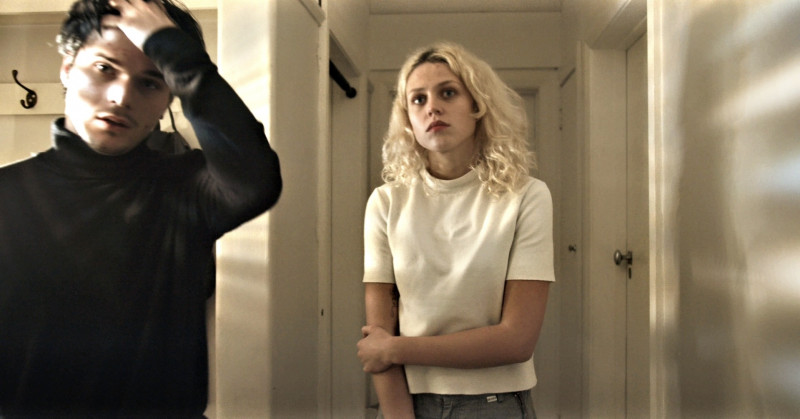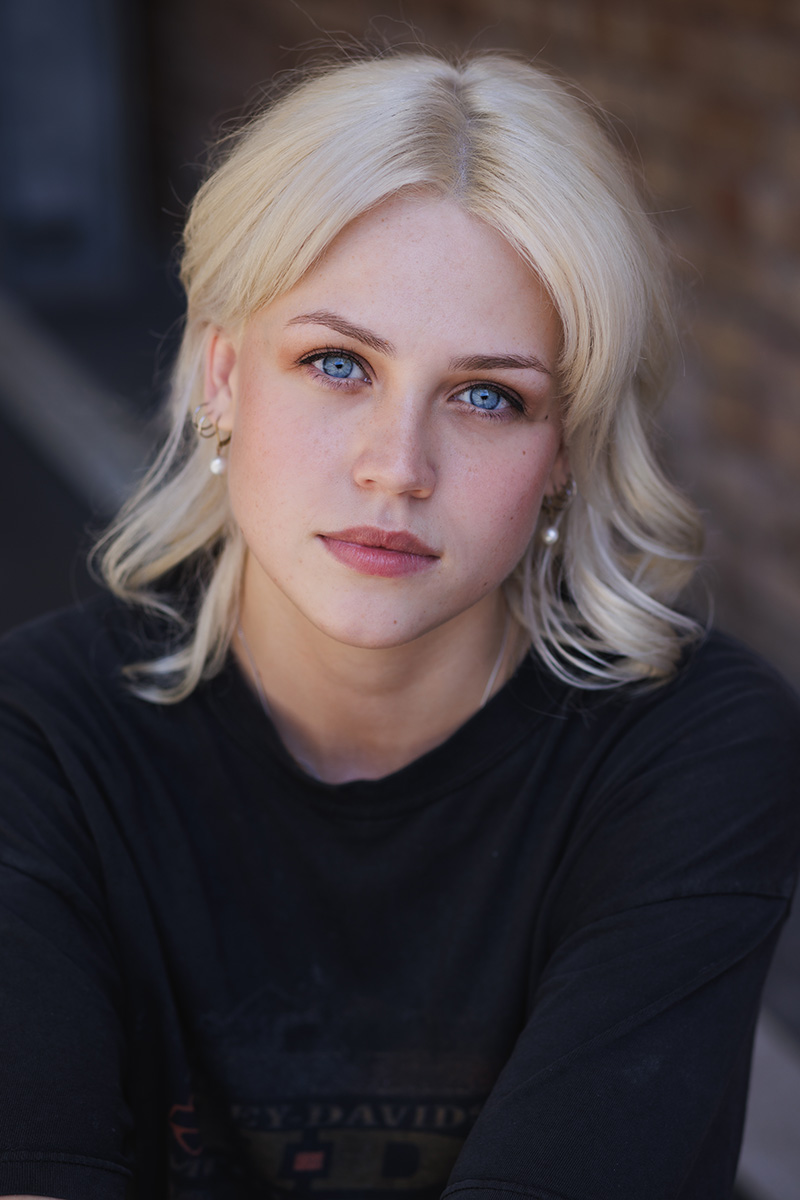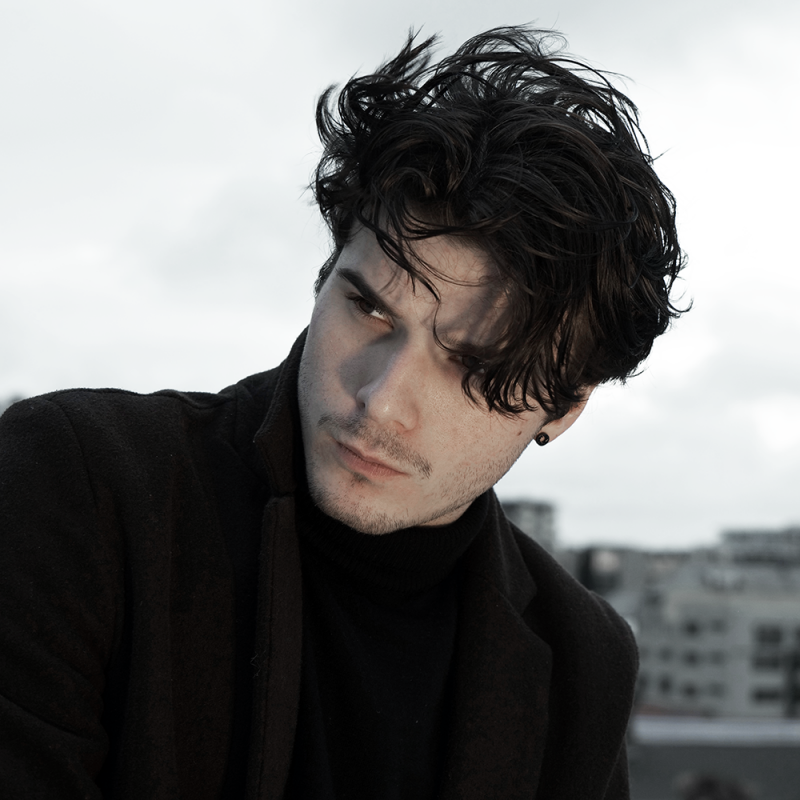


Wellington Silver Screeners: Lola McLeod-Riera and Flynn Biara Allan by Alessia Belsito-Riera
In our Wellington Silver Screeners series, Alessia Belsito-Riera shines a spotlight on the movers and shakers working in the film capital of New Zealand.
Tuned Out was the overall winner of the 2023 New Zealand Youth Film Festival (NZYFF). Written and directed by Te Kunenga ki Pūrehuroa Massey University student Flynn Biara Allan and starring Pōneke-based actress Lola McLeod-Riera, Tuned Out follows two girls trapped in a war zone, deprived of basic essentials. Suddenly, they’re confronted by an unsympathetic film crew wanting to exploit their trauma. Many of the cast and crew members grew up together and represent the unparalleled talent of the next generation of creatives.
From their win, they’ll enjoy lunch with Sir Richard Taylor, Tania Rodger, and the Wētā Workshop team, plus the film will be screened on various platforms. I down with these filmmakers of tomorrow to get the inside scoop on what the future holds.
What do you love about filmmaking and storytelling?
Flynn: One of the main reasons I love storytelling is the process and reward of making and sharing it with others. When you’re creating a sad story you might cry, a scary one you might get chills, and action-packed ones you might get a hit of dopamine or excitement. When you share them, you receive the beautiful reward of observing others experience those similar and universal human emotions. You are simulating the best and worst parts of life. If you tell a story right, it creates memories and in turn creates unmatched change in people.
Lola: I’m very emotion-based, so I quite like the raw emotion that comes from acting. I like that it’s a place where you can be vulnerable. Showing emotion is often seen as weak and being sensitive as a bad thing, but with acting it’s really empowering. People can get a visceral reaction from it. It’s something that brings people together.
How and why did you become a part of NZYFF?
F: The plan from the start of the year was to make a film that would hopefully win. Why we chose the NZYFF in particular is networking. A lot of film festivals offer a far bigger cash prize. However, as a student with industry-level equipment already readily available, the most important thing becomes our name. I feel like NZYFF opened the right doors for everyone involved in the crew and cast because everyone that was supporting the film festival and sponsoring them was passionate about helping the underdogs and the people who haven’t quite reached where they are. They remember what it was like to be in our position.
What was your first thought when you found out your film had won?
F: It was very raw. We had a 30-second trailer of the film that was shown at the event, and we didn’t win the age category we were nominated for. We thought originally that if you get the age category prize, you go in to get the overall prize. After the trailer, people were coming up to me and saying, ‘The trailer looked really cool, better luck next time, man’. But I was holding out hope.
L: We all thought there was no way we’d win overall. There were 426 entries.
F: There were people in there that had a lot more experience, and we thought it was cool that we were nominated. Then I heard the first few letters, and I just stood up and screamed – I scared the announcer! It was a build-up all year. This was the goal: we didn’t know if we’d get it, but we would try our absolute best to tell a story that people can be inspired by. I’m still running on the dopamine.
L: It replays in my head every so often!
Flynn, where did the idea for Tuned Out come from?
F: I tend to write poems before I write a film about an idea that I want to share and a message I want to convey. It occurred to me that news is treated like an entertainment source, and so when people get tired of hearing the same news it just starts disappearing, even if the events remain and people are still suffering. I came up with the idea that it was like an audition. It started in a room where the forgotten events would wait for an audition for a part in the news.
Are you worthy to be on the world stage?
F: Exactly. Sorry, your pain isn’t great enough. How would you say that to someone? It’s horrible. So I wanted to push that. I played the antagonist so unfortunately, I had to say it [laughs]. It’s a separation between what’s relevant and what’s important.
Lola, how did you prepare for the role of Clara?
L: A lot of sleep deprivation! I cry very easily, I have big emotions, so I think that reading about someone that needs help and comparing it to everything happening, the emotion was readily available to slip into. I have never been in her situation, obviously, but it is a very real thing that happens, so I was able to sympathise and empathise with that. Also having the other character, Tesha [Elia Correa] – she was supposed to be a younger character that Clara found in the warzone. I have four younger siblings that I love so much, so comparing her to them and imagining wanting to protect them helped a lot.
Pivoting a bit, what is special about Wellington’s film industry?
L: There is something special about it. I suppose this would count for New Zealand overall, but because we’re so small, we’re really bloody good at what we do. Everyone is really supportive of each other in Wellington.
F: Compact and successful. Quality over quantity. Once you know a few people you have reach in every which way of the industry. Even directors that directed us as child actors came up to us after the festival. One of them is helping me with my script at the moment.
What advice would you give someone who is where you were a few years ago and wants to take the next step?
F: I’m in no qualified position to give godly advice, but at least from what I have found there are a few things. Don’t make student films, not in this day and age because you don’t need to. We have iPhones that are better than cameras 10 years ago. We have some incredible equipment, so go make whatever you want because you can! You have all the technology to do so. Don’t limit yourself to what you can do. When you’re writing a script, write it in such a way that’s almost impossible and then bring it down. A lot of filmmakers say uni isn’t important and that you can learn everything on set, but what you can’t do is meet the people that are just as passionate as you are about the exact same stuff. You might go weeks without learning anything new, but you’re communicating and meeting people. Also momentum – like with this win, it’s great but it’s not the start-all, end-all. We have to keep the momentum going. Another one is just have fun and be kind. You won’t do your best work if everyone is grumpy and can’t reach out. It’s a fun job!
L: Willpower. Rejection is so hard. You have to get used to it. More often than not you get told you’re not good enough, that you just don’t look quite right. With acting, a lot of it is out of your hands because you have to fit into the category of the character, as well as be good at it. There are so many times I’ve been second-best. As cheesy as it is, just don’t give up because you will find something that’s right for you. The euphoric feeling of getting cast and being around likeminded people is worth it.
What are you currently working on and what’s next?
F: I’m working on a big project that I’ve been conceiving for the last two years. It’s called Harmony Inc, and it tosses up the ideas of the future of AI technology being used for mental health and allowing for special surgical operators to enter someone’s mind and sweep things off shelves or remove trauma by packing it up and taking it away.
L: I was supposed to be acting in it, but I am moving overseas! So I’m just doing pre-production, which I’ve never done before so it’s quite exciting.
Where do you see yourself in 15 years? What would be your dream come true?
F: The dream would be to have a limitless ability to tell stories. I’d like to say change the world but that’s quite difficult. I’d at least like to say I tried and maybe change the film industry a little bit because we’re growing into this multimedia thing and I don’t want cinema to die, so threading in different mediums could be really cool.
L: I just want to be in things that I get joy out of. What’s the saying? If you do a career that is your hobby, you’ll never work a day in your life. I think acting is that one thing for me. Success doesn’t have to be famous; it’s just doing it and in things I feel passionate about. I would like to make a living wage off acting. I would also like to be able to really help at least one person in my life, and I feel like acting can do that – any of the arts – because they speak out to people.
F: You’re crafting memories.
View more articles from:
« Issue 227, August 27, 2024

